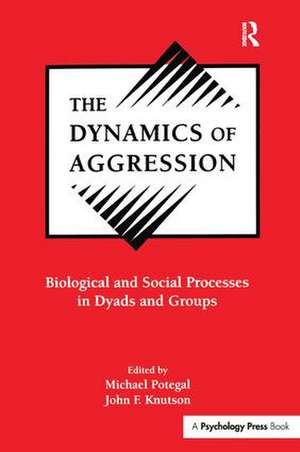The Dynamics of Aggression: Biological and Social Processes in Dyads and Groups
Editat de Michael Potegal, John F. Knutsonen Limba Engleză Paperback – 23 sep 2016
* The economic interpretation: Aggression will be escalated when it pays one of the combatants to do so or, more generally, when the potential benefits outweigh the risks. Decisions to escalate or de-escalate are part of a calculated "strategy", in one or another sense. This interpretation is formalized within game theoretic models as applied to animal conflicts and to international conflicts, within the chapters of this text.
* The psychological process interpretation: Emphasis is placed on psychological/physiological processes within the individual. The chapters stress the importance of acute emotional states of anger and aggressive arousal and argue the role of peripheral sympathetic activation, while proposing a central neural mechanism. Children escalating their tantrums, adult humans and animals of other species intensifying their interpersonal conflicts, national leaders going to a war footing all appear to suffer a narrowing of attention and progressive failure of cognitive function under the intensifying stress of conflict. Perhaps these changes in attention, sensory and cognitive functions, and risk taking reflect a "commitment to aggression" which is necessary for organisms to engage in potentially dangerous and painful encounters.
* The emergent process interpretation: Escalation emerges in a spontaneous and dynamic way as the actions of one participant elicit reactions from the other(s).
Preț: 449.41 lei
Nou
Puncte Express: 674
Preț estimativ în valută:
85.100€ • 90.01$ • 71.57£
85.100€ • 90.01$ • 71.57£
Carte tipărită la comandă
Livrare economică 31 martie-14 aprilie
Preluare comenzi: 021 569.72.76
Specificații
ISBN-13: 9781138997820
ISBN-10: 113899782X
Pagini: 368
Dimensiuni: 152 x 229 x 20 mm
Greutate: 0.45 kg
Ediția:1
Editura: Taylor & Francis
Colecția Psychology Press
Locul publicării:Oxford, United Kingdom
ISBN-10: 113899782X
Pagini: 368
Dimensiuni: 152 x 229 x 20 mm
Greutate: 0.45 kg
Ediția:1
Editura: Taylor & Francis
Colecția Psychology Press
Locul publicării:Oxford, United Kingdom
Public țintă
ProfessionalCuprins
Contents: Preface. Part I: Differing Perspectives on Aggression Dynamics: Introduction to Game Theoretical Analyses and Arousal Hypotheses. J. Archer, F. Huntingford, Game Theory Models and Escalation of Animal Fights. L. Berkowitz, On the Escalation of Aggression. Part II: Aggressive State and Trait: Behavioral and Physiological Processes Within Individuals. D. Zillmann, Cognition-Excitation Interdependencies in the Escalation of Anger and Angry Aggression. M. Potegal, Aggressive Arousal: The Amygdala Connection. P.M. Bronstein, Aggression Waxing (Sometimes Waning): Siamese Fighting Fish. G.V. Caprara, M. Perugini, C. Barbaranelli, Studies of Individual Differences in Aggression. Part III: Aggression Dynamics in Development: Interactions Within and Outside the Family. D. Einon, M. Potegal, Temper Tantrums in Young Children. J.F. Knutson, M.E. Bower, Physically Abusive Parenting as an Escalated Aggressive Response. R.B. Cairns, C. Santoyo V., K.A. Holly, Aggressive Escalation: Toward a Developmental Analysis. Part IV: Aggression Dynamics in Larger Social and Political Contexts: Game Theory Revisited. J. Bohstedt, The Dynamics of Riots: Escalation and Diffusion/Contagion. R.J. Leng, Interstate Crisis Escalation and War.
Notă biografică
Michael Potegal, John F. Knutson
